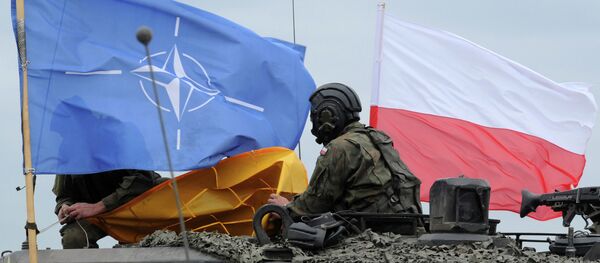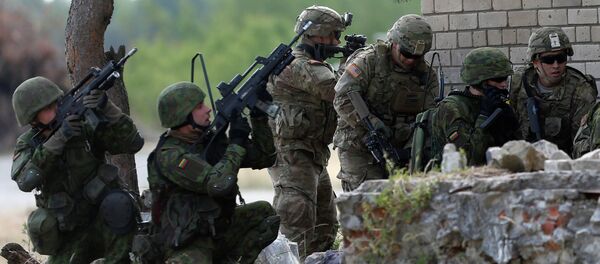Washington's European ballistic missile defense (BMD) system project kicked off by NATO back in 2011, is one of the Alliance's most ambitious programs that allows it to cement its military presence in Eastern Europe; and there is hardly any other goal the Alliance is pursuing by implementing the European BMD program.
George Friedman, founder of Strategic Forecasting Inc. (Stratfor), also known as a "shadow CIA," says that it is not clear whom the BMD is expected to protect Europe from.
"Missile defense in Europe has become as much a political symbol as a weapon. I would argue that if political symbols matter, then it has served a purpose, because it is hard to envision the military purpose of the system," Friedman wrote in his article for Geopolitical Futures.
According to Friedman, the possibility of a nuclear strike is extremely low: "You would have to be crazy to use it [nuclear weapons]."
However, Warsaw and Washington are planning to build the anti-missile base — part of the complex European BMD system — in the Polish town of Redzikowo by 2018. A similar base became operational on May 5 in Romania.
Nearly simultaneously, NATO announced its plan to deploy about 4,000 troops (four battalions) in the Baltic states and Poland as part of the Alliance's strategy which aims to "deter" Russia.
The German Defense Ministry signaled its readiness to station a rotating military contingent of between 150 and 250 soldiers to Lithuania, Deutsche Welle reported late April, citing the German Press Agency. The announcement followed the visit of Lithuanian President Dalia Grybauskaite to Berlin on April 20.
The EU member states do not regard Russia as an imminent threat to Europe.
Furthermore, although Polish Foreign Minister Witold Waszczykowski last month went even so far as to claim that Russia, not Daesh, poses the main security challenge to the EU, Poland is much more concerned about the ongoing refugee crisis engulfing Europe, Stremidlovsky points out in his analysis for Regnum.
He cites Jaroslaw Kaczynski, the leader of the Polish ruling right-wing Law and Justice (PiS) party, who has repeatedly stated that the party is against bringing asylum seekers to Poland since there is no guarantee that the gesture of good will would not lead to the Paris-style terror attacks in the country.
Interestingly enough, experts admit that the victory of Poland's right-wing Euroskeptic party was obviously linked to its tough stance toward the EU refugee policy.
Stremidlovsky emphasizes that Polish policymakers and thought leaders are aware that NATO is incapable of protecting the country from the growing terror threat and is unable to contain the increasing flow of refugees.
Alas, NATO's military installations in Poland by no means meet today's needs of Warsaw: instead they are aimed at accomplishing Washington's geostrategic tasks in the region, he stresses.
According to the analyst, there are clear signals that NATO member states, the US and Germany, are using the current uncertain geopolitical situation in Eastern Europe to their own advantage, de facto dividing the region into "zones of influence."
However, while Lithuania and the other Baltic states are likely to welcome Germany taking them under Berlin's wing, Poland has its own geopolitical aspirations in the region.
Warsaw won't agree to cede part of its sovereignty neither to the EU nor to Washington, Stremidlovsky notes referring to the fact that Poland has increasingly been adopting a more independent, more sovereign and more nationalist policy. And it means Warsaw and Washington will soon face trouble in paradise, the analyst suggests.




